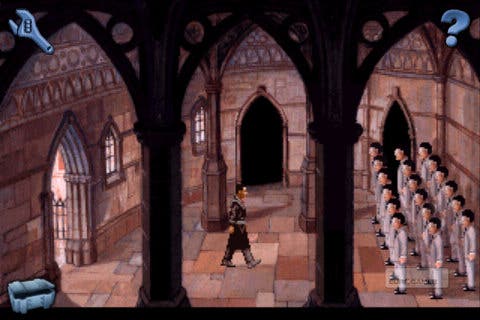When Comics Met Videogames
Cecil and Gibbons reunite beneath a steel sky.
I was called in to provide illustrations and also to have creative input so I got to provide suggestions for the story and the look of the characters. So it was much like the best parts of working in comics. You kind of throw your ingredients into the soup and people throw theirs. It was a very creative experience and looking back it was a very enjoyable time.
I think that videogames have a lot that they can learn from linear mediums. It's often said that they are quite different and that game makers shouldn't be trying to create films or remake comics - and I completely agree with that - but we shouldn't discount finding inspiration from other mediums. When you write a story for an adventure game it's different to most mediums. In games the chunks of narrative effectively reward successful interactions and set up the scene for the next section of gameplay.
If you think of a first-person shooter, it really is pretty much a linear story, with gameplay interstitials. Conversely, in an adventure game you ideally want to build the puzzles around the story and vice versa. Puzzles should be relevant so that when you solve them, something logically moves forward in terms of the plot. That requires the designer to mould the story and the gameplay closely together - to interweave them. But beyond that consideration, an inspirational linear storyteller like Dave can offer an enormous amount.
It's also important to have a really strong visual identity. In all of the comics that I have drawn, from Watchmen, to March to Washington, I've tried to give them a really distinctive visual identity. The recent trend in games has been towards very realistically rendered 3D visuals but I actually think this is a blind alley. I personally find things that are done with a little bit of stylisation, and a bit of control, more interesting than just somebody who is trying to approximate bad reality, something comics excel at. So I think that both media have a lot to offer one another.

I completely agree. Clearly games like the sports simulations are now so realistic that they are well to the right of the uncanny valley, but for many many other games that try to look realistic but don't quite pull it off, there's a very off-putting appearance. As a result, I've always aimed to write games that are believable but not especially realistic, firstly to avoid the uncanny valley, but secondly because it allows you to express something visually more interesting than reality.
The strength of comics is that readers approach with an expectation that they'll have to suspend their disbelief: in real life people don't have outlines, they don't have word balloons floating above their heads, so you know in any comic book everyone acknowledges you're presenting a story in a stylised way. That approach translates equally well into games and I think that people actually like seeing reality through someone else's stylised vision. Games shouldn't shy away from that. Actually, Arkham Asylum is actually very good in that regard. I like the stylisation...
Well, I'm actually a bit torn on this, because when I was growing up I liked the idea that adults disapproved of comics; it gave me and the other kids our own kind of private world which was concealed from adults, and I think that, to begin with at least, that's been the case with videogames. Grown-ups didn't quite understand, like it was like a sub-culture, and I think it's almost a shame when a medium loses that in the struggle for acceptance.
That said, my son is now 30, and still plays games, and the games have become more sophisticated. He plays a lot of stuff online, something that engenders the same kinds of feelings as sports do. So I think they will find their own cultural level soon enough. Also, I think that a game is not only as good as the people who designed it, but also it's only as good also as the people who play it. As the audience evolves, so games will evolve and become accepted in a way that people in their sixties and seventies today are passionate about The Beatles or The Rolling Stones, acts that were culturally looked down upon when they were teenagers.








